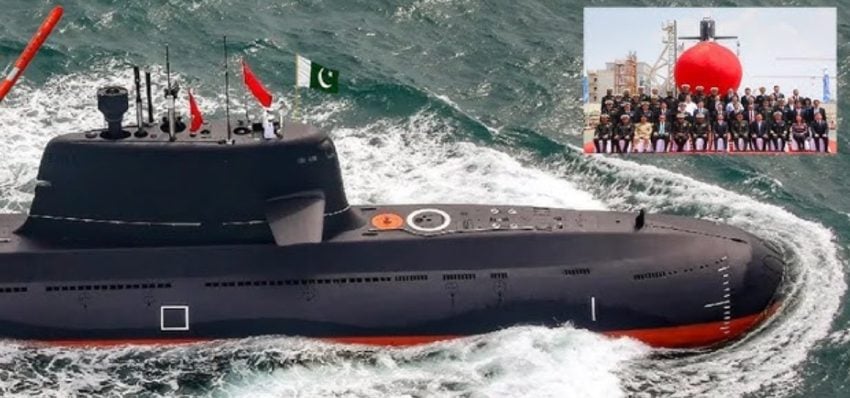ISLAMABAD – Pakistan Navy is expected to welcome its first Chinese-designed Hangor-class submarine, a major development that could redefine the strategic balance between South Asia’s two nuclear neighbors.
Islamabad is preparing to deploy its first-ever Chinese-designed Hangor-class submarine next year to dramatically shift the balance of naval power in the Indian Ocean and intensify Beijing’s strategic contest with New Delhi.
Pakistan’s top naval commander Admiral Naveed Ashraf confirmed to foreign media about multibillion-dollar submarine program with Beijing is “progressing smoothly” and will revolutionize the country’s maritime defenses. $5 billion deal, which is one of China’s largest arms export projects, will see Islamabad receive eight state-of-the-art diesel-electric attack submarines by 2028.
These submarines will significantly enhance Pakistan’s ability to monitor and secure the North Arabian Sea and the wider Indian Ocean, Admiral Ashraf declared, hailing Chinese technology as reliable, cutting-edge, and perfectly suited to Pakistan’s naval requirements.
The announcement comes amid growing military tensions in South Asia. Earlier this year, Pakistan’s Air Force stunned observers when it reportedly shot down an Indian Rafale fighter jet, made by France, using Chinese-built J-10. The incident sent shockwaves through defense circles, challenging long-held assumptions about the dominance of Western-made weapons over China’s fast-evolving arsenal.
Under landmark submarine agreement, the first four Hangor-class vessels are being built in China, while the remaining four will be constructed in Pakistan. Three of the submarines have already touched water in China’s Hubei province, launched into the Yangtze River with military fanfare.
The submarines, believed to feature advanced stealth capabilities and long-endurance underwater systems, will serve as a key deterrent against India’s expanding naval fleet.
Naval forces are now entering a new era, one defined by unmanned technology, artificial intelligence, and next-generation electronic warfare systems.
Islamabad has long been China’s closest military partner. Between 2020 and 2024, Pakistan accounted for over 60% of Beijing’s total arms exports, according to the Stockholm International Peace Research Institute (SIPRI).
This booming defense partnership mirrors China’s deepening economic footprint in Pakistan through the massive China-Pakistan Economic Corridor (CPEC) — a $60 billion flagship project under President Xi Jinping’s Belt and Road Initiative. Stretching 3,000 kilometers from China’s Xinjiang province to the Arabian Sea port of Gwadar, CPEC provides Beijing with a direct and secure trade route to the Middle East — bypassing the vulnerable Strait of Malacca.
Meanwhile, New Delhi is watching closely as Analysts warn that arrival of China-backed submarines in Pakistan’s fleet could trigger a new undersea arms race in the Indian Ocean, one of world’s most contested waterways.













